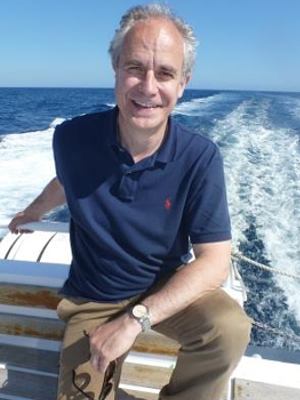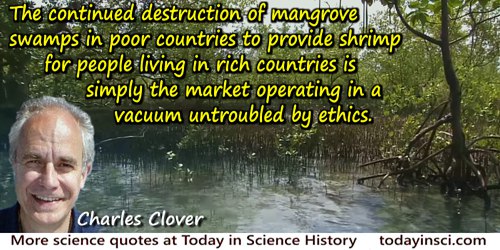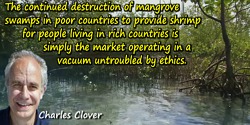 (source)
(source)
|
Charles Clover
(22 Aug 1958 - )
British journalist and author who joined the Daily Telegraph in 1987 and served as its environment editor (1989-2008). From 2009, he became a columnist for the Sunday Times on environmental topics. He coauthored a book (1993) with Prince Charles about organic farming at his Highgrove estate in the Cotswolds. Clover’s second book, The End of the Line, (2004) was about problems of over-fishing.
|
Science Quotes by Charles Clover (8 quotes)
Domesticated salmon, after several generations, are fat, listless things that are good at putting on weight, not swimming up fast-moving rivers. When they get into a river and breed with wild fish, they can damage the wild fish's prospects of surviving to reproduce.
— Charles Clover
In The End of the Line: How Overfishing is Changing the World and what We Eat (2004), 312.
Fish farming, even with conventional techniques, changes fish within a few generations from an animal like a wild buffalo or a wildebeest to the equivalent of a domestic cow.
— Charles Clover
In The End of the Line: How Overfishing is Changing the World and what We Eat (2004), 312.
I believe citizens are beginning to realize that their birthright, a healthy ecosystem, has been stolen, and they want it back.
— Charles Clover
In The End of the Line: How Overfishing is Changing the World and what We Eat (2004), 317.
I have never seen a food writer mention this, but all shrimp imported into the United States must first be washed in chlorine bleach to kill bugs. What this does for the taste, I do not know, but I think we should be told.
— Charles Clover
In The End of the Line: How Overfishing Is Changing the World and What We Eat (2008), 301.
Nobody in the world of policy appears to be asking what is best for society, wild fish or farmed fish. And what sort of farmed fish, anyway? Were this question to be asked, and answered honestly, we might find that our interests lay in prioritizing wild fish and making their ecosystems more productive by leaving them alone enough of the time.
— Charles Clover
In The End of the Line: How Overfishing Is Changing the World and What We Eat (2008), 313.
The continued destruction of mangrove swamps in poor countries to provide shrimp for people living in rich countries is simply the market operating in a vacuum untroubled by ethics.
— Charles Clover
In The End of the Line: How Overfishing Is Changing the World and What We Eat (2008), 300.
Those who nod sagely and quote the tragedy of the commons in relation to environmental problems from pollution of the atmosphere to poaching of national parks tend to forget that Garrett Hardin revised his conclusions many times…. He recognized, most importantly, that anarchy did not prevail on the common pastures of medieval England in the way he had described…. “A managed commons, though it may have other defects, is not automatically subject to the tragic fate of the unmanaged commons,” wrote Hardin…. At sea, where a common exists in most waters… None of Hardin’s requirements for a successfully managed common is fulfilled by high-seas fishery regimes.
— Charles Clover
In The End of the Line: How Overfishing is Changing the World and what We Eat (2004), 153-155.
Why should the leaders of chemical businesses be held responsible for polluting the marine environment with a few grams of effluent, which is sublethal to marine species, while celebrity chefs are turning out endangered fish at several dozen tables a night without enduring a syllable of criticism?
— Charles Clover
In The End of the Line: How Overfishing is Changing the World and what We Eat (2004), 189.
See also:
- The End of the Line: How Overfishing Is Changing the World and What We Eat, by Charles Clover. - book suggestion.



 In science it often happens that scientists say, 'You know that's a really good argument; my position is mistaken,' and then they would actually change their minds and you never hear that old view from them again. They really do it. It doesn't happen as often as it should, because scientists are human and change is sometimes painful. But it happens every day. I cannot recall the last time something like that happened in politics or religion.
(1987) --
In science it often happens that scientists say, 'You know that's a really good argument; my position is mistaken,' and then they would actually change their minds and you never hear that old view from them again. They really do it. It doesn't happen as often as it should, because scientists are human and change is sometimes painful. But it happens every day. I cannot recall the last time something like that happened in politics or religion.
(1987) -- 


